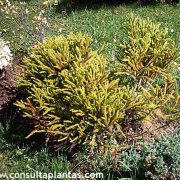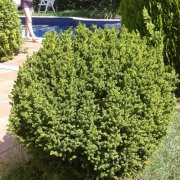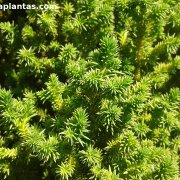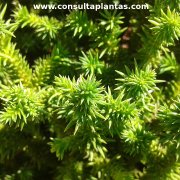Care of the shrub Juniperus squamata or Flaky juniper |
|
The Juniperus genus, Cupressaceae family, comprises 60 species of shrubs and trees native to the Northern Hemisphere. Some species are: Juniperus squamata, Juniperus phoenicea, Juniperus oxycedrus, Juniperus horizontalis, Juniperus conferta, Juniperus communis, Juniperus chinensis, Juniperus californica, Juniperus osteosperma, Juniperus drupacea, Juniperus thurifera, Juniperus x pfitzeriana (hybrid), Juniperus brevifolia. Common names: Himalayan juniper, Flaky juniper. This species is native to Asia. They are evergreen shrubs that reach 2 meters (6.56 feet) in height (erect varieties) and 3 meters (9.84 feet) in diameter (creeping varieties). The leaves are needle-shaped and can be of different colors depending on the variety (most are bluish). The flowers are not decorative. They produce spherical, glossy black fruits. The main varieties are: Juniperus squamata var. Meyeri, spreading growth and bluish-green foliage; Juniperus squamata var. Old gold, with green and yellow leaves; Juniperus squamata var. Wilsonii, pyramidal in size. Himalayan juniper is used in rockeries, on borders, as isolated specimens next to a wall and in pots for terraces and patios. It combines very well with heather (Heather) and with other dwarf conifers. Juniperus squamata needs full sun exposure. It resists the humid environments of the Atlantic, the frosts and the Mediterranean summers. The soil can be a garden substrate with peat and coarse sand; they can grow in limestone or stony soils. Transplanting and planting are done in the fall or spring. Water regularly so that the substrate does not dry out completely; it does not tolerate intense drought. Himalayan juniper is a very sensitive plant to waterlogging. Fertilize each fall with compost. Juniperus squamata does not need pruning. Flaky juniper is a resistant plant to pests but can be attacked by fungi if there is excess humidity. Himalayan juniper propagates by cuttings of young shoots in autumn or by layering (creeping species). |
Images of the shrub Juniperus squamata or Flaky juniper |
Find plants
Juniperus squamata or Flaky juniper | Care and Growing
© 2026 FavThemes



